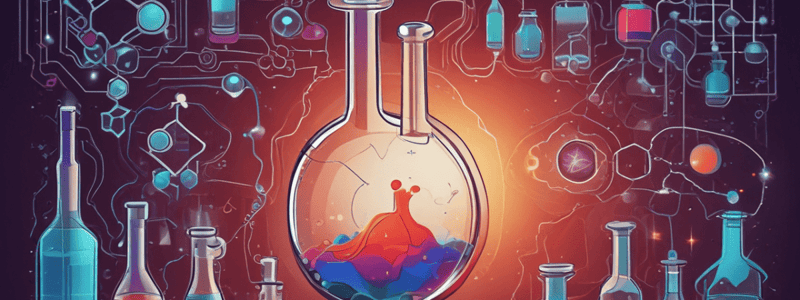Podcast
Questions and Answers
What is the smallest part of an element that can exist?
What is the smallest part of an element that can exist?
An atom
What is the difference between physical and chemical properties of elements?
What is the difference between physical and chemical properties of elements?
Physical properties include state, appearance, smell, and magnetic properties, while chemical properties include what an element reacts with and how reactive it is.
How are compounds formed from elements?
How are compounds formed from elements?
By chemical reactions
What is the key characteristic of a compound?
What is the key characteristic of a compound?
How can compounds be separated into elements?
How can compounds be separated into elements?
What is a molecule, and how does it relate to elements and compounds?
What is a molecule, and how does it relate to elements and compounds?
What is the general rule for naming compounds, especially when a metal and a non-metal react?
What is the general rule for naming compounds, especially when a metal and a non-metal react?
What is the typical number of elements in a compound with a name ending in –ate?
What is the typical number of elements in a compound with a name ending in –ate?
How are the elements organized in the Periodic Table?
How are the elements organized in the Periodic Table?
What is the characteristic of elements in the same group of the Periodic Table?
What is the characteristic of elements in the same group of the Periodic Table?
Where are metals typically located in the Periodic Table?
Where are metals typically located in the Periodic Table?
What does a chemical symbol represent?
What does a chemical symbol represent?
What information does a chemical formula provide?
What information does a chemical formula provide?
What is the purpose of a subscript number in a chemical formula?
What is the purpose of a subscript number in a chemical formula?
What is the composition of one molecule of HNO3?
What is the composition of one molecule of HNO3?
What is the key difference between an element and a compound?
What is the key difference between an element and a compound?
What are the two main categories of properties that elements can exhibit?
What are the two main categories of properties that elements can exhibit?
What happens to elements when they undergo a chemical reaction to form a compound?
What happens to elements when they undergo a chemical reaction to form a compound?
What is the significance of the term 'molecule' in chemistry?
What is the significance of the term 'molecule' in chemistry?
Why do compounds have different properties from the elements they are composed of?
Why do compounds have different properties from the elements they are composed of?
What is the purpose of following rules when naming compounds?
What is the purpose of following rules when naming compounds?
How can a compound be separated into its constituent elements?
How can a compound be separated into its constituent elements?
What determines the number of atoms of an element in a molecule, according to a chemical formula?
What determines the number of atoms of an element in a molecule, according to a chemical formula?
In what direction are groups organised in the Periodic Table?
In what direction are groups organised in the Periodic Table?
What is the typical location of non-metals in the Periodic Table?
What is the typical location of non-metals in the Periodic Table?
What information does the chemical formula of a molecule or compound provide?
What information does the chemical formula of a molecule or compound provide?
What is the purpose of a chemical symbol?
What is the purpose of a chemical symbol?
How are the periods in the Periodic Table organised?
How are the periods in the Periodic Table organised?
What is the characteristic of elements in the same period?
What is the characteristic of elements in the same period?
What is the composition of a compound with a name ending in –ate?
What is the composition of a compound with a name ending in –ate?
Flashcards are hidden until you start studying




